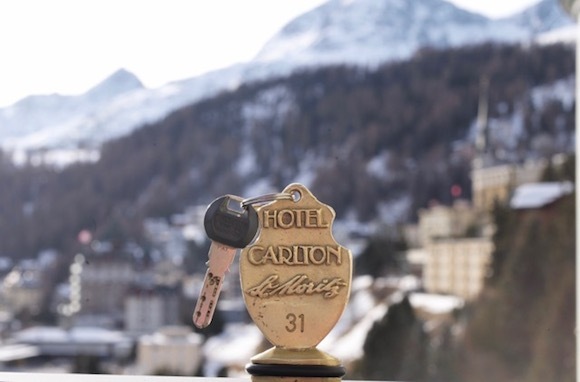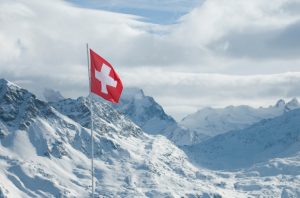The film begins with establishment shots of mountain scenery and downhill skiing. It's 1934 and we are in St. Moritz, Switzerland, an Alpine resort town that the English upper classes have only recently been convinced is as attractive in winter as it is in summer.
The Lawrence family has come for the fresh mountain air and Alpine sports. Mommy is a crack sharpshooter (for sport only, at least at first). Not sure what Daddy does; perhaps he's living off family money back in London. And Betty, their rambunctious daughter, has a knack for getting into hot water.
We are talking, of course, of Alfred Hitchcock's "The Man Who Knew Too Much," an espionage thriller set in St. Moritz and London. Soon we are in the dining room of what is clearly a five-star hotel, complete with large orchestra and couples gliding on the dance floor. A bullet flies through a window, killing one of the guests. And that's when the fun begins.
Everything was filmed in a London studio, but Hitch was probably inspired by Badrutt's Palace, to this day once of St. Moritz's five 5-star hotels, all of them synonymous with the best of Swiss hospitality.
Long before I knew where Hitchcock set his masterpiece, I knew I wanted to visit this chic place. And now, here I was.
Alpine winter tourism began in St. Moritz and then quickly spread to other Swiss mountain resorts. Johannes Badrutt, then the owner of the still-extant Hotel Kulm, made a bet with four of his clients at the close of the 1864 summer season: leave chilly and foggy London this winter to get a sun tan on my terrace in your shirtsleeves; if you're unhappy, I'll reimburse your travel costs from London to St. Moritz and back. But if you like St. Moritz in winter? Stay as long as you like on me.
They stayed until Easter. Winter tourism in the Swiss Alps became a thing.
Hitchcock first came to St. Moritz in 1924, and returned here two years later for his December honeymoon with Alma Reville, staying at Badrutt's Palace Hotel (these days, locals just call it "the Palace"). He professed no fascination with skiing or sledding, however, having remarked, "I am a devotee of winter sports from a distance." But he returned time and again for Christmas holidays and to celebrate his anniversary. "I just like sitting in my hotel room and looking at the snow," Hitchcock once told an interviewer.
As I write this, I'm doing the same thing. I'm staying at the smaller and more intimate, but no less luxurious, Carlton Hotel rather than at the Palace or the Kulm, but my view of the snow-covered mountains on this snowy day in early February is probably the same one that entertained the famous director. I type, I look out the window; I type, I look out the window. It's distracting, but isn't distraction part of the magic of the Swiss Alps in winter?

I'm certain that much has changed in St. Moritz since Hitch's day, but equally sure that much hasn't. Tradition rules here. One emblematic indication: my room key here at the Carlton consists of a heavy brass fob, which looks like it was forged in 1913, the year the hotel was built, to which is attached an electronic key. They could have just gone with a plastic key card, but that wouldn't be Swissness. The general manager, Dominic Bachofen, greets each guest, whether movie star or first-timer like me, individually upon arrival, like a host would to his own home. Indeed, he lives in the 61-room hotel, just off the reception desk. "Guests have been known to knock on my door if they have a problem," he told me one day.
But exactly what there is to complain about I didn't discover. There's a high tech lighting system and electronically controlled sunshades and speedy WiFi throughout, along with plentiful electrical sockets and bright, LCD bedside reading lamps. All rooms here have the same gorgeous view, facing south to the mountains, so when the snow ended I sat on my balcony and enjoyed the sunshine that Badrutt was so proud of.
Little things of a less high-tech nature have been thought through here. When I let my room door close by itself, I notice on my third day, it slowly, gently, quietly shuts itself and locks with barely a sound instead of slamming with a bang like so many hotel room doors. Why don't all hotels do that? Doors connecting between rooms are extra thick so noise doesn't leak through. Little things have been tweaked with the precision of a fine Swiss watch.
And although I spent much of my stay gazing out the window at the snow-covered mountains, I also got a splendid massage in the hotel's spa, ate some delicious meals in the Michelin-starred restaurant, sipped Swiss wines on the sun terrace, and hanged out in the ornate lobby reading a Georges Simenon whodunit, watching guests come and go. Hitch would have approved. And one afternoon I watched "The Man Who Knew Too Much" on my iPad. I won't tell you how it ends.
Have a look at our current fare finds to Zurich (ZRH) from all over the US and Canada.
Travel time from Zurich to St. Moritz by train takes about three hours. More info available at SwissTravelSystem.com, as well as the St. Moritz Tourist Office.






